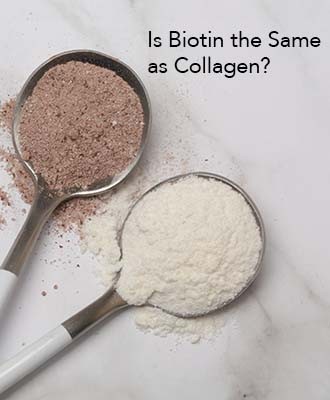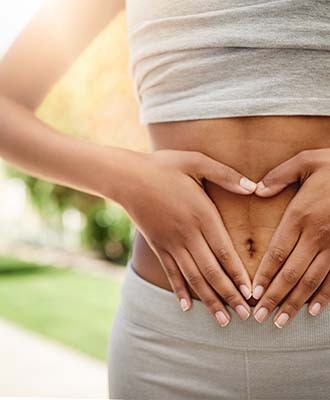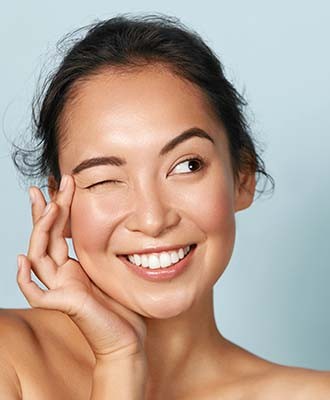Is Biotin the Same as Collagen?
- By Yonboon Team
- March-7-2024
If you stroll through any pharmacy’s beauty aisle, you will see lots of products having collagen and biotin in them.
But the question is, “Is biotin the same as collagen?”
The short answer would be ‘NO’. How these two well-known supplements function in your body is very different.
Well, we can clearly say that collagen and biotin are ideal for improving skin health and hair condition, but for different reasons.
In this detailed blog, we will discuss those reasons and characteristics. Read on to know which one is better for your skin, and which is perfect to promote strong hair.
Let’s start with the basics first.
What Is Biotin?
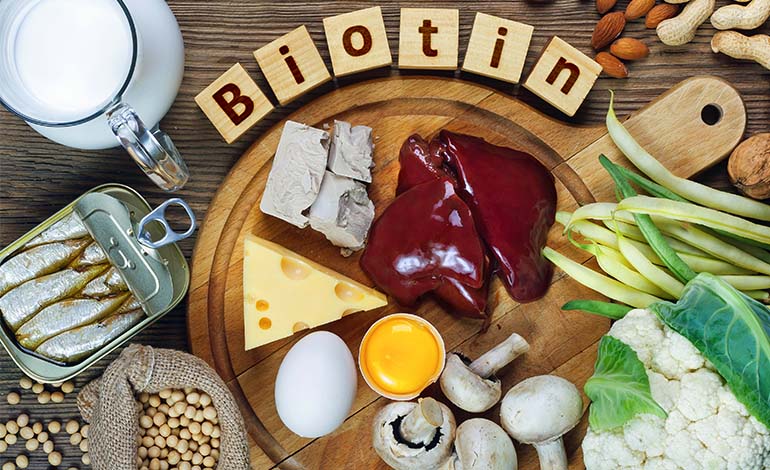
Biotin is also known as vitamin B7 or vitamin H—a vitamin B complex. In its most basic form, biotin helps the body’s ability to transform food into usable energy.
It serves as a vital co-factor for carboxylase enzymes. These enzymes are essential for multiple metabolic activities, such as the metabolism of amino acids & fatty acids, gluconeogenesis and energy production.
What Are the Natural Sources of Biotin?
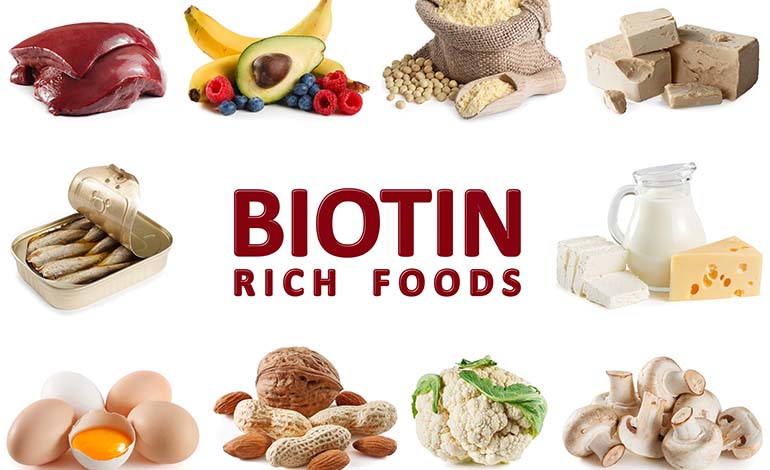
You can obtain biotin from natural sources by eating a healthy and well-balanced diet. These are the food super rich in biotin:
- Dairy (milk, cheddar cheese, yogurt)
- Egg yolk
- Fish (sardines, salmon, tuna)
- Whole grains (oatmeal, whole wheat bread)
- Seeds (sunflower)
- Fruits (apples, bananas, avocados, raspberries)
- Yeast
- Nuts (peanuts, almonds)
- Vegetables (carrots, sweet potatoes cauliflower, broccoli, spinach)
- Meat (including organ meat such as liver)
And What is Collagen?
If you are a regular reader of our crisp blogs, you already know that collagen is the primary structural protein found in your body.It provides the perfect shine, smoothness and strength to your hair, nails and yes of course skin. Our natural collagen levels decrease with aging. As a result, you see those wrinkles, fine lines, sagging skin, brittle nails and lifeless hair.
For this reason, it’s important to use oral collagen products that supplement your body’s natural collagen levels.
Read also: Is Marine Collagen Better Than Bovine?
What Are the Natural Sources of Collagen?
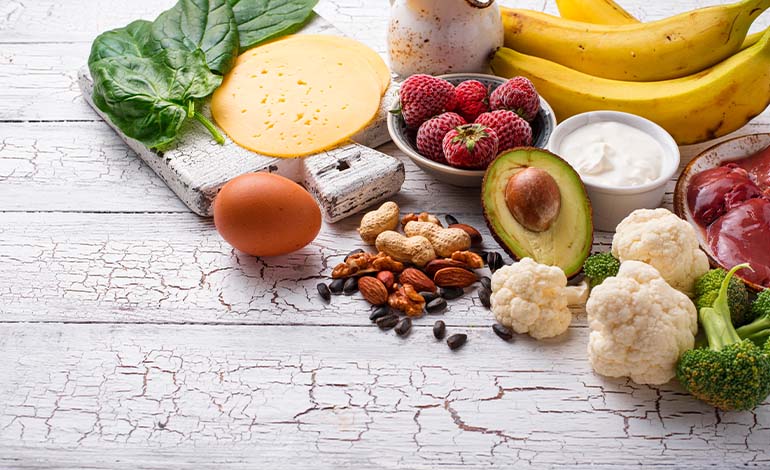
The first thing you should do is decide to modify your diet because eating is the best way to get nutrients that your body requires.
These foods are highly rich in collagen:
- Dietary items such as skin, bones, tendons and ligaments of chicken, beef, pork
- Eggs and fish
- Bone broth prepared from the bones of animals
For such people, hydrolyzed marine collagen supplements are the ideal choice.
Eating a range of healthy meals rich in protein, zinc, vitamin C and copper are also known to enhance collagen synthesis in the body.
Biotin Vs Collagen: What Are the Main Differences
If you ask, ‘Is biotin better than collagen?’, it would be like asking is vitamin C better than calcium.Well, both nutrients are crucial for better health, but they have diverse benefits and different purposes. The same goes for collagen and biotin.
Both are essential for the appropriate functioning of the human body, improving skin health, hair and nails growth.
Rather than weighing the pros and cons of each, it’s better to intake biotin and collagen together.
Biotin Benefits
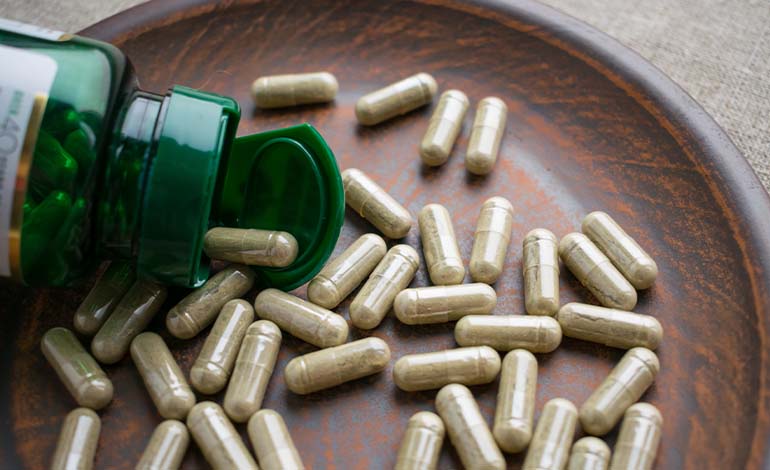
Apart from being an essential vitamin, biotin has a few key functions in our bodies. Many research studies back the following perks and benefits of biotin:
- Promoting skin health
- Better hair growth
- Joint support
- Essential for the body to produce fatty acids and glucose (that works a fuel for your body)
- Supporting cellular processes that result in the formation of skin cells and hair follicles
- Supporting the metabolism of proteins, carbohydrates and fats
Collagen Benefits
As the prominent protein in our body, collagen has several important functions. You can get maximum benefits from collagen supplements combined with vitamin C, biotin, copper, zinc and β-carotene.There are over 20 different kinds of collagen, but the most prevalent ones are those found in our body.
The amazing benefits of collagen include but are not limited to:
- Promoting the health and production of connective tissues
- Strong and firm bones, fibrous cartilage
- Cushioning your joints
- Keeping muscles, organs and arteries healthy
- Preventing premature aging
Which Is Better for Skin?
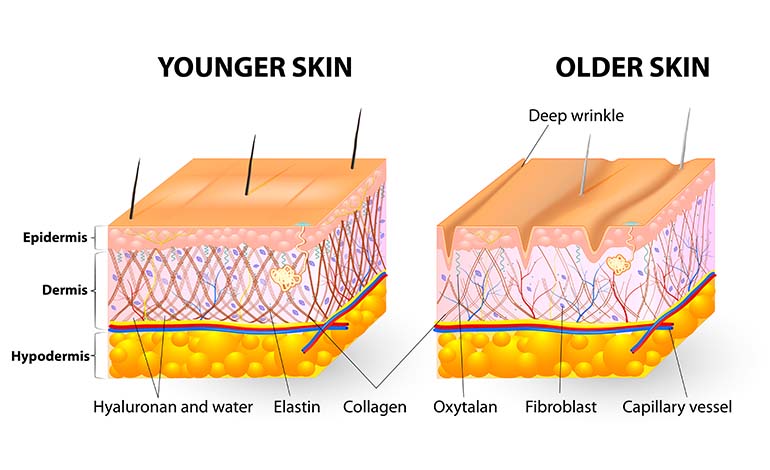
If you are some with biotin deficiency, you can take biotin supplements for better skin health. If not, then taking collagen protein supplements would be a better choice as collagen is the key element for maintaining healthy skin.
Most scientific studies prove that it enhances the appearance of your skin way better than biotin.
Collagen maintains the flexibility and strength of the skin and is an important component for its proper functioning function.
A recent study showed that people who took 1000 mg of oral collagen supplements displayed better skin in terms of skin elasticity, hydration and reduced wrinkles.
Consuming 2.5 to 5 grams of marine collagen powder daily for 8 weeks can improve the overall health of your skin.
So, while vitamin supplements are known to support skin, hydrolyzed collagen is ideal for improved skin conditions.
And Which Is Better for Hair?
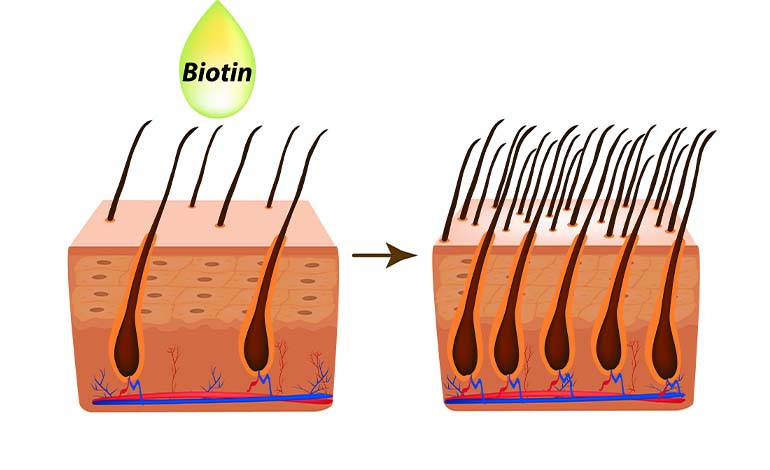
Hair loss is one of the primary indicators of biotin deficiency. If you are someone who is suffering from biotin deficiency, using a supplement rich in biotin can be your knight in shining armor!
Biotin also helps in hair growth and strengthening of hair follicles. Let’s discuss this from an example, in a recent study, around 72 percent of female participants who underwent weight reduction surgery showed signs of hair loss.
For a period of 3 months, half of the participants (with biotin deficiency) received 1000 micrograms (mcg) of biotin daily.
And out of them, 23 percent of individuals noticed a significant decrease in hair fall. The same process was followed for individuals who didn’t have a biotin deficiency. Around 30 percent of those participants showed a noteworthy decline in hair loss.
So, the study concluded that biotin could help both individuals with and without biotin deficiency in preventing hair loss.
Well, there isn’t any solid evidence to support the fact that biotin helps stop hair loss in people without biotin deficiency.
On the other hand, if you take biotin supplements in adequate amounts, it shouldn’t be too dangerous to consume on a regular basis.
Read also: The Benefits of Taking Collagen While Fasting
Safety and Side Effects
Although biotin is a vitamin that is important for all living things and is safe to eat, taking low-grade supplements might cause negative effects. Consuming biotin supplements may alter the results of certain blood and hormone tests.Taking about side effects of collagen, they might have minimal to low side effects and are considered safe. Just like other dietary supplements, you may feel nauseous or bloated.
How Much Biotin and Collagen Supplements Should I Take Daily?
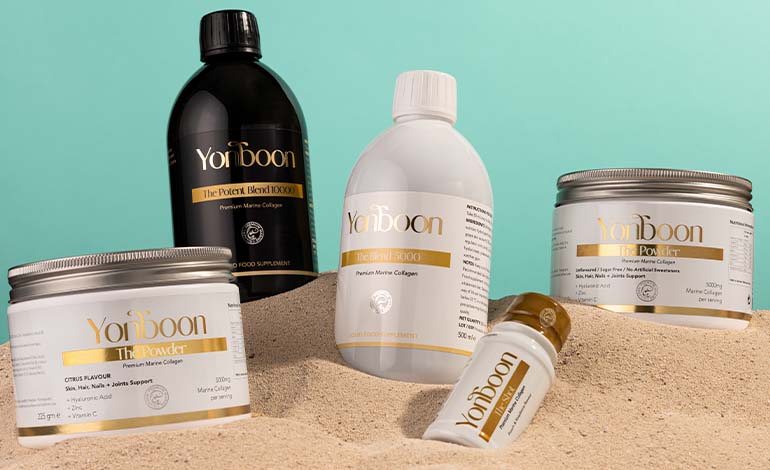
The daily dose might depend on age and gender. Studies showed that taking around 30 mcg of biotin is safe for people over the age of 19.
Most of the people acquire adequate biotin from their diet. While taking 10 to 30 grams of collagen supplements daily is considered safe. However, the dosage depends on your goals.
For example, you need collagen in large amounts for bone and joint support whereas for improved skin health, small amount of collagen supplements will also work.
So, Which Supplement is Right for You?
Biotin or collagen supplements? Which should I take? Which is better than the others?Honestly speaking, you need a wide variety of minerals, vitamins and proteins for the proper functioning of your body.
Just like vitamin B complex, biotin helps in the production of energy in your body. While collagen helps in supporting your connective tissues.
Biotin and collagen both can be important for the health of your hair, but you might want to go with biotin supplements.
Collagen helps to improve skin hydration and reduces wrinkles while biotin promotes hair development and strengthens fragile nails.
Prioritizing one over the other isn’t a rational approach. However, scientific studies confirmed the benefits of if you want to improve your skin health and overall well-being.
Read also: 4 Collagen Myths Debunked
FAQs
Is it better to take biotin or collagen?
Well, it’s hard to pinpoint the clear-cut benefits in order to decide whether biotin is better, or collagen is more suitable. Both address different facets of skin and hair health. If your primary goal is to enhance skin condition, go with collagen supplements. And if you want to boost your hair growth, biotin supplements are your way to go. For best results, it is ideal to consume collagen supplements that have biotin as their main ingredient.Which collagen is best for hair?
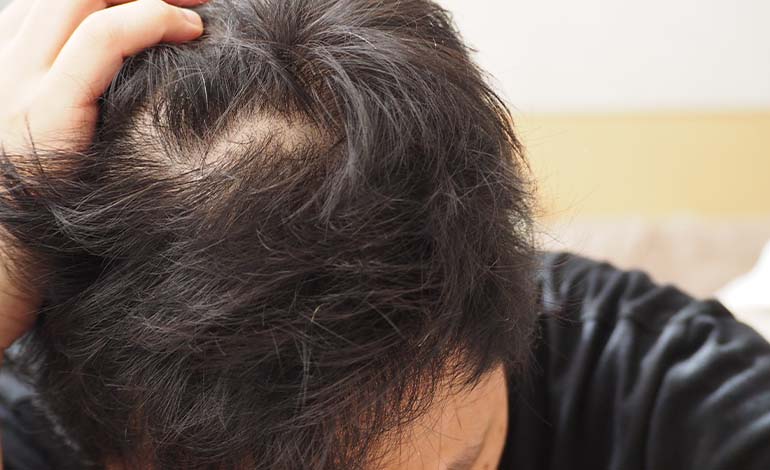
The type of collagen that is best for hair health is type I and type III collagen. It is present in our hair, skin and nails. Yonboon marine collagen is rich in type I collagen and is considered ideal for better hair growth due to its high bioavailability.
Can I take biotin and collagen supplements together for better results?
Definitely yes. Taking biotin and collagen supplements together is totally safe. For people looking to improve both their skin and hair, consuming both supplements may be an ideal option.What are the potential side effects of biotin and collagen supplements?
Usually, when taken in the right dosages, biotin and collagen supplements are safe. There’s no clear-cut evidence that these supplements can be toxic. As mentioned earlier, taking biotin at high doses may lead to interference with certain lab test such as:- Vitamin D
- Hepatitis
- Thyroid Panels
- HIV
- b-HCG (a hormone present in the blood of pregnant women)
While collagen is found naturally in our body, it is unlikely to have major side effects if taken orally. More than 80 percent of people who take collagen supplements regularly claim it had no negative effects.
It should be noted that a few supplements may cause allergenic responses, have unfavorable side effects or interfere with prescribed medicines. We would advise you to use premium quality collagen supplements to avoid such side effects.
Are there any dietary sources that naturally contain both biotin and collagen?
Yes, there are many natural sources of biotin and collagen. A huge range of foods contain biotin, such as eggs, meat (beef liver), fish (salmon), milk, plain yogurt almonds, cheddar cheese, apples, and whole-wheat bread. Animal products such as chicken, fish and bone broth contain collagen.Seeds, legumes, soy products and nuts also contain 3 major amino acids (proline, glycine, and hydroxyproline) that help our bodies make collagen.
Do biotin and collagen supplements interact with medications?
Biotin and collagen supplements, when taken in the right doses, do not interact with common medications. However, exceeding the amount of these supplements may interfere with several drugs. The interactions may affect the absorption and effectiveness of the medicines. So, it is advisable to consult with your doctor before starting these supplements if you are on any medications.Let’s Sum It Up
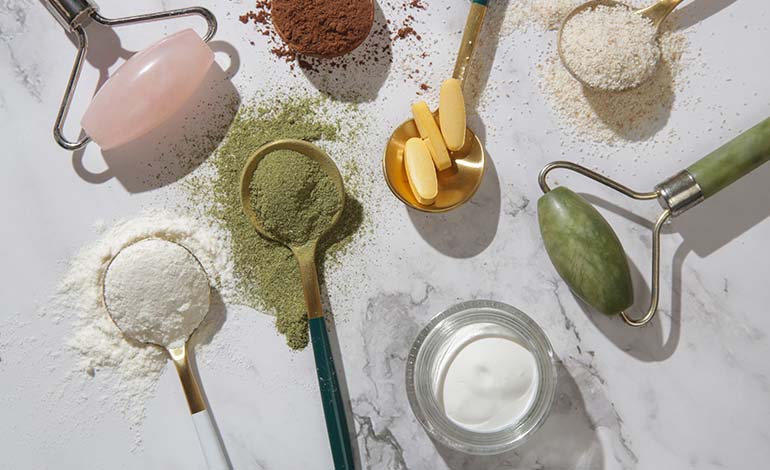
Biotin and collagen—both nutrients play important but different roles in maintaining good health. Although they have numerous benefits, both are associated with healthy hair, better skin, and strong nails.
Biotin, also known as vitamin B7, is an essential vitamin that your body cannot produce on its own and must be supplemented through diet or supplements. Whereas collagen is naturally produced by your body but starts to decrease with age. It can also be supplemented with oral collagen products (like shots, syrups and powder).
So, for our question, “Is biotin the same as collagen?” We can conclude that biotin and collagen are entirely different.
Biotin is a vitamin while collagen is a protein. Both offer different benefits for your beauty regimen, with different outcomes.
Biotin is better for hair health while collagen is ideal for promoting hydrated skin. If you are unsure how much collagen should you take daily for nourished skin, our detailed guide would be helpful for you.
